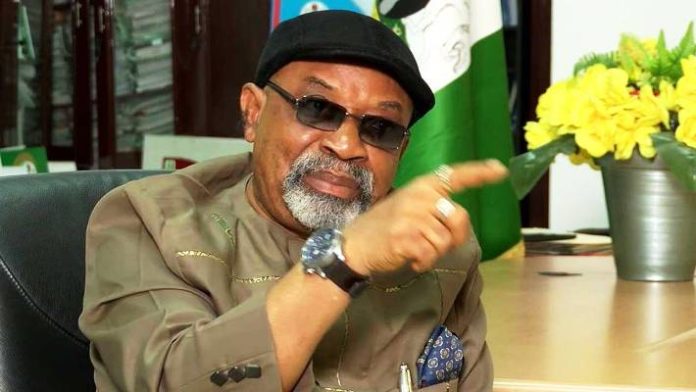Nigeria is to set up an inter-ministerial task team comprising the Ministry of Labour and Employment, Communication and Digital Economy, Youths and Sports, Women Affairs and other relevant ministries to fully key into the emerging digital economy to maximize the abundant opportunities available to young people.
The Minister of Labour and Employment, Sen. Chris Ngige said this today when he was joined by the Hon. Minister of Communications and Digital Economy, Dr. Isa Ali Pantami and that of youths and sports, Sunday Dare to receive in audience, a high level mission from the International Labour Organisation (ILO) and the International Telecommunication Union (ITU).
The two international partners are in Nigeria on partnership for the creation of Decent Jobs and entrepreneurship through the global framework for Digital Skills facilitation for Youths in Africa.
The Minister who said inter-ministerial and agency synergy had become imperative in line with recommendations of the National Economic Advisory Council to the President, added that time was gone when ministries and even parastatals within ministries work in silos, and leave a huge gap in achieving set goals in youth employment.
Ngige said “the era of working in silo is over. That’s why the three Ministers are here. This is one of the recommendations of the National Economic Advisory Council to the President; that there is a lot of working in silo. You see Ministry of Sports, Digital Economy, Technology, and even parastatals within some Ministries duplicating efforts on different and at times contrasting programmes on skills and empowerment. We are now harmonizing everything so as to work in synergy to achieve the desired goals.
He commended the visiting Joint ILO-ITU partnership programme which is supported by the Africa Union and African development bank, emphasizing the need for the exercise to critically address the peculiar needs of countries against a one-size-fits-all module that may end up producing quick fixes and no sustainable successes.
The minister also implored the team to target the abundant but misplaced digital literacy and skills of some Nigerian youths and turn them in to legally productive digital ventures as a sure way to arrest the surging incidence of cybercrimes.
On his part, the Minister of Communications and Digital Economy, Ali Pantami expressed the preparedness of Nigeria to pull through from the traditional to the digital economy, utilizing the partnership of the private sector to create jobs and lift 100 million Nigerians from poverty in ten years, in line with the vision of the President.
The Minister gave an over view of the strategic pillars of the Nigeria’s digital economic vision as well as its goals , saying the focus was to leverage on the emerging digital capacities to churn out employers of labour through an appropriate alignment of certificates with skills. He harped on the centrality of ICT to development in other sectors.
On his part minister of youths and sports Sunday Dare commended the initiative but however raised observations on its sustainability
He said Nigeria has had such opportunities in the past but young people after acquiring such skills, return to the job market, and therefore called for stronger commitment to ensure youths are not only empowered but made investors.
Earlier, the ILO Regional Director for Africa, Cynthia Olajuwon who led the team said that “Africa’s growing youth population and the continent’s transition to digital economy represents a huge opportunity to bolster African economies while addressing important levels of unemployment and working poverty among young people.”
She said that the programme, Boosting Decent Jobs and Enhancing Digital Skills For Youths in Africa’s Digital Economy, is a contribution to the 2020 Agenda for Sustainable Developmentand part of Call for Action adopted by the 2012 International Labour Conference.
She listed the aims of the programme to include job creation and entrepreneurship opportunities on the demand side labour; investment in youth digital skills as it relates to supply as well as engendering private and public employment services for the digital era.
She added that the programme was aimed at “disseminating knowledge and best practice across the region so as to enable replicability and economies of scale.”
The ITU African regional Director, Andrew Rugege said Africa’s 335 million youth population can no longer wait to benefit from the over $300 billion available in the digital economy.
Rugege said” Africa is ready to take up the challenge to get most of her young people key into and benefit from the enormous gains in the digital economy. He assured the support of the ITU for the African digital economy through adequate radio resources backbone, adding that a standardization bureau to ensure that digital economy in Africa conforms to international standards will be established.
Charles Akpa
DD Head/Press & Public Relations






